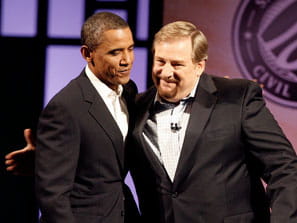Under a 1993 law, gays and lesbians can enter legal partnerships with all the rights and obligations of marriage, except adoption and church weddings. Foss, a Conservative, married long-term partner Jan Erik Knarbakk in a ceremony at the Norwegian Embassy in Stockholm, Sweden.
The Norwegian Finance Ministry confirmed the wedding but said Foss was giving no interviews or comment because it is a personal matter. "Yes, we entered a partnership at the embassy in Stockholm on Friday, Jan. 4," Foss told the Norwegian business newspaper Dagens Naeringsliv. "But beyond that, it is a private matter."
Knarbakk is a top manager in the Schibsted publishing concern and the two have been described in the news media as being among Norway's most powerful couples. Foss is a member of a three-party coalition government led by Lutheran clergyman Kjell Magne Bondevik of the Christian Democratic party, which opposes homosexual marriages.
However, Foss was openly gay and living with his partner when he joined the government and it was not an issue in his appointment to the powerful post of finance minister. Norwegians are broadly tolerant of homosexuals and traditionally respect the private lives of public figures so the wedding was simply noted briefly, without comment, by the news media.
About 100 couples a year enter gay partnerships in the capital city of Oslo.
Copyright 2002 Associated Press. All rights reserved. This material may not be published, broadcast, rewritten, or redistributed Intrigue and wrangling: who to lead the Church of England Kevin McElderry
Agence France-Presse London, Jan. 16--(AFP) It has much of the intrigue, posturing, ideological splits and personality clashes of any political campaign for the leadership of a centuries-old global body. But this is the job of Archbishop of Canterbury, for heaven's sake, head of the Church of England and spiritual leader of some 70 million souls worldwide in the Anglican Communion.
It is not supposed to be like this, hints of racism and dirty tricks adding fuel to existing theological differences over homosexuality, the ordination of women and remarriage of divorcees. "The degree of interest shown in candidates is akin to the kind of coverage you would expect in a political election," a Church of England spokesman told AFP. He said the appointments panel, of 16 senior clerics and lay members, would "carefully and prayerfully and deliberately get on with its job."
Once in place, the new man -- women only began to be ordained as priests in 1994 -- will have to lead a church bleeding worshippers and influence. Anglican membership in Britain numbers some 1.6 million, less than half the figure 50 years ago, and even fewer attend regularly. Moreover, the church's message can appear increasingly ignored in a secular world.
Yet it remains the establishment church in England, still widely respected around the world, and its archbishop hobnobs with royal and political leaders alike from the splendours of his own palace in central London.
George Carey, the 103rd man to hold the position, announced last week that he is to retire in October after 11 years in charge. He will continue to carry out all his duties for the Church of England and the Anglican Communion, a global federation of churches, until then. His move has sparked a battle between the liberal and conservative wings of the church founded by King Henry VIII nearly five centuries ago.
Legally speaking, it is Queen Elizabeth who must appoint Carey's successor, but convention dictates she accepts the recommendation of Prime Minister Tony Blair. The joint favourites for the job are Dr Michael Nazir-Ali, England's first ethnic minority diocesan bishop, and the Bishop of Liverpool, James Jones. Other alleged runners -- no one applies for the job -- are said to include Archbishop of Wales Rowan Williams, and Bishop of London Richard Chartres.
It is Nazir-Ali who has been making all the waves. First, he insisted he was not the "social conservative" of past reputation, citing his support for women priests. His remarks, a day after Carey's announcement, were seen by his critics as showing unseemly haste to get the top job. Then, unfounded claims appeared in the press that Pakistan-born Nazir-Ali, the Bishop of Rochester, had fiddled his age and academic record.
His allies hinted at a dirty tricks campaign, although one other allegation -- that he used to be a Catholic -- is true. "I still retain things from my past as everyone does. I try to be a rounded Christian," he told the Sunday Telegraph in reply. He also hinted at racism. "I just hope the Church rises above this kind of approach to what is the choice of a Christian leader."
Of the other candidates, Jones is seen as a standard-bearer of evangelical Anglicans, and is reported to have the backing of Blair. Chartres, for his part, can claim royal support, according to officials of Prince Charles, heir to the throne and thus the future supreme governor of the Church of England. Williams, a leading liberal, is said to have the backing of women's groups, gay campaigners and Anglo-Catholics.
The appointments panel will assess various names for the job before coming up with a final shortlist of two. Blair then makes the final recommendation to the queen. A Church of England spokesman said the process would likely take nine or 10 months, meaning Carey's successor should arrive just as he leaves.

